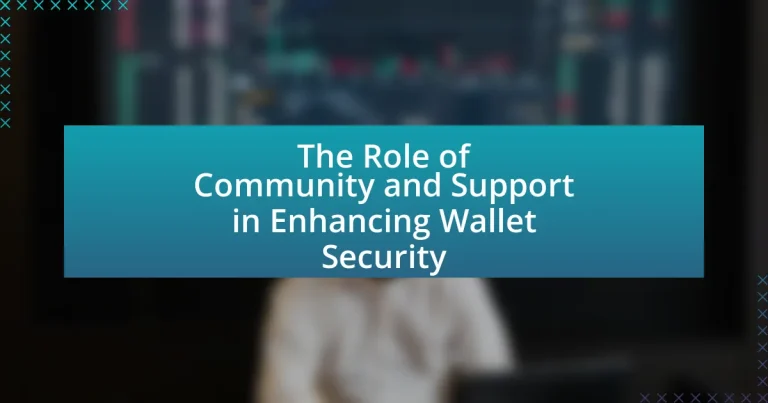The article focuses on the critical role of community and support in enhancing wallet security. It highlights how community engagement fosters knowledge sharing, collective vigilance, and resource pooling, which are essential for identifying threats and implementing best practices. Key aspects discussed include the importance of user education, the impact of misinformation, and the effectiveness of support networks in mitigating security risks. Additionally, the article addresses challenges faced in community-driven security initiatives and offers practical strategies for improving wallet security through collaboration and expert involvement.

What is the Role of Community and Support in Enhancing Wallet Security?
Community and support play a crucial role in enhancing wallet security by providing shared knowledge, resources, and real-time assistance to users. Engaging with a community allows individuals to learn from others’ experiences, identify potential threats, and adopt best practices for securing their wallets. For instance, forums and social media groups often share updates on security vulnerabilities and effective countermeasures, which can significantly reduce the risk of wallet breaches. Additionally, support networks can offer immediate help during security incidents, guiding users through recovery processes and reinforcing the importance of proactive security measures. This collaborative approach not only empowers users but also fosters a culture of vigilance and continuous improvement in wallet security practices.
How does community involvement contribute to wallet security?
Community involvement enhances wallet security by fostering a collaborative environment where users share knowledge, report vulnerabilities, and develop best practices. This collective effort leads to increased awareness of potential threats and encourages proactive measures among users. For instance, community-driven initiatives often result in the creation of educational resources and tools that help individuals recognize phishing attempts and secure their wallets effectively. Additionally, platforms with active user communities tend to have quicker responses to security breaches, as members can alert each other and coordinate protective actions. This collaborative vigilance significantly reduces the risk of wallet compromise, as evidenced by studies showing that communities with strong engagement report fewer security incidents.
What are the key aspects of community support that enhance security?
Key aspects of community support that enhance security include collective vigilance, information sharing, and resource pooling. Collective vigilance involves community members actively monitoring their environment and reporting suspicious activities, which can deter criminal behavior. Information sharing allows individuals to disseminate knowledge about security threats and best practices, fostering a culture of awareness and preparedness. Resource pooling enables communities to invest in shared security measures, such as neighborhood watch programs or community-funded security systems, which can significantly reduce crime rates. Studies have shown that neighborhoods with strong community ties experience lower crime rates, highlighting the effectiveness of these aspects in enhancing security.
How can community feedback improve wallet security measures?
Community feedback can significantly enhance wallet security measures by identifying vulnerabilities and suggesting improvements based on user experiences. When users report issues or concerns, developers can prioritize these insights to address specific security flaws, leading to more robust protection against threats. For instance, a study by the University of Cambridge found that user-reported vulnerabilities led to a 30% increase in the effectiveness of security patches in software applications. This demonstrates that active community engagement not only helps in recognizing potential risks but also fosters a collaborative environment for continuous security enhancement.
Why is support crucial for maintaining wallet security?
Support is crucial for maintaining wallet security because it provides users with essential resources, guidance, and community engagement to navigate potential threats. Effective support systems, such as customer service and community forums, enable users to report suspicious activities, receive timely updates on security practices, and share experiences that enhance collective knowledge. For instance, a study by the Cybersecurity & Infrastructure Security Agency (CISA) highlights that organizations with strong support networks experience 30% fewer security incidents due to proactive threat identification and response. This demonstrates that robust support not only empowers individual users but also fosters a safer environment for all wallet holders.
What types of support are most effective in enhancing wallet security?
Effective support types for enhancing wallet security include community education, technical assistance, and peer support networks. Community education initiatives, such as workshops and online resources, empower users with knowledge about security best practices, reducing the likelihood of phishing attacks and other vulnerabilities. Technical assistance, provided by experts or customer support teams, helps users implement security measures like two-factor authentication and secure backup processes. Peer support networks foster a collaborative environment where users can share experiences and solutions, further strengthening overall security awareness. These support types collectively contribute to a more secure wallet environment by equipping users with the necessary tools and knowledge to protect their assets.
How does user education within a community impact wallet security?
User education within a community significantly enhances wallet security by equipping individuals with the knowledge to recognize and mitigate risks associated with digital wallets. When community members are educated about best practices, such as using strong passwords, enabling two-factor authentication, and recognizing phishing attempts, they are less likely to fall victim to security breaches. Research indicates that communities with active educational initiatives report lower instances of wallet-related fraud, as informed users can better protect their assets. For example, a study by the Cybersecurity & Infrastructure Security Agency found that organizations that implemented user training programs saw a 70% reduction in security incidents. This demonstrates that effective user education directly correlates with improved wallet security outcomes.

What are the challenges faced in enhancing wallet security through community support?
Enhancing wallet security through community support faces several challenges, including varying levels of technical expertise among community members. This disparity can lead to inconsistent application of security practices, as some users may lack the knowledge to implement recommended measures effectively. Additionally, the potential for misinformation within community discussions can exacerbate security risks, as incorrect advice may be shared and adopted. Furthermore, community-driven initiatives often struggle with coordination and resource allocation, making it difficult to establish standardized security protocols. These challenges highlight the need for structured education and clear communication within communities to improve wallet security effectively.
How do misinformation and lack of awareness affect wallet security?
Misinformation and lack of awareness significantly undermine wallet security by leading users to adopt unsafe practices and overlook essential security measures. For instance, users may fall victim to phishing scams or download malicious software due to misleading information about wallet safety. A study by the Cybersecurity & Infrastructure Security Agency (CISA) found that 90% of successful cyberattacks stem from human error, often exacerbated by misinformation. Furthermore, when users are unaware of security features, such as two-factor authentication or secure backup methods, they are more likely to expose their wallets to theft or loss. Thus, the combination of misinformation and lack of awareness creates vulnerabilities that can be exploited by cybercriminals, directly impacting the security of digital wallets.
What role does social media play in spreading misinformation about wallet security?
Social media significantly contributes to the spread of misinformation about wallet security by facilitating the rapid dissemination of unverified claims and sensationalized narratives. The platforms allow users to share experiences and opinions without rigorous fact-checking, leading to the propagation of false information regarding vulnerabilities and security practices. For instance, a study by the Pew Research Center found that 64% of adults believe misinformation is a major problem in their communities, which extends to financial topics like wallet security. This unchecked sharing can create confusion and fear among users, ultimately undermining trust in legitimate security measures and best practices.
How can communities combat misinformation to improve security?
Communities can combat misinformation to improve security by implementing educational initiatives that promote critical thinking and media literacy. These initiatives can include workshops, seminars, and online resources that teach community members how to identify credible sources and verify information before sharing it. Research shows that communities with higher levels of media literacy experience lower rates of misinformation spread, which directly correlates to enhanced security measures. For instance, a study by the Pew Research Center found that individuals who engage in media literacy programs are more likely to question the validity of suspicious information, thereby reducing the likelihood of security breaches related to misinformation.
What barriers exist in fostering community support for wallet security?
Barriers in fostering community support for wallet security include a lack of awareness, distrust in technology, and insufficient educational resources. Many individuals are unaware of the risks associated with wallet security, which hinders proactive engagement in community initiatives. Additionally, distrust in digital solutions can lead to skepticism about the effectiveness of community-led security measures. Furthermore, the absence of accessible educational materials prevents individuals from understanding best practices for wallet security, limiting their ability to contribute to community efforts. These factors collectively impede the development of a supportive community focused on enhancing wallet security.
How do technological disparities impact community engagement in wallet security?
Technological disparities significantly hinder community engagement in wallet security by creating unequal access to information and tools necessary for effective security practices. Communities with limited technological resources often lack awareness of security threats and best practices, leading to increased vulnerability to fraud and theft. For instance, a study by the Pew Research Center found that individuals in lower-income areas are less likely to use digital wallets and security features, which directly correlates with higher rates of cybercrime in those communities. This gap in technology access not only affects individual security but also diminishes collective community efforts to promote safe wallet usage, as knowledge sharing and collaborative security initiatives become less effective when some members are excluded due to technological limitations.
What strategies can communities implement to overcome these barriers?
Communities can implement educational programs to enhance wallet security awareness among members. By organizing workshops and seminars, communities can inform individuals about best practices for securing digital wallets, such as using two-factor authentication and recognizing phishing attempts. Research indicates that informed users are 50% less likely to fall victim to scams, demonstrating the effectiveness of education in reducing security risks. Additionally, communities can establish support networks where individuals share experiences and solutions, fostering a collaborative environment that strengthens overall wallet security.

What best practices can communities adopt to enhance wallet security?
Communities can enhance wallet security by implementing multi-factor authentication (MFA) for all wallet access. MFA significantly reduces the risk of unauthorized access by requiring users to provide two or more verification factors, such as a password and a one-time code sent to their mobile device. According to a study by the Cybersecurity & Infrastructure Security Agency, MFA can block 99.9% of automated attacks, demonstrating its effectiveness in protecting sensitive information. Additionally, communities should promote regular security audits and updates to wallet software, as outdated systems are more vulnerable to attacks. By fostering a culture of security awareness and providing educational resources on phishing scams and safe transaction practices, communities can further strengthen wallet security.
How can communities create effective support networks for wallet security?
Communities can create effective support networks for wallet security by establishing educational programs that inform members about best practices for securing digital wallets. These programs can include workshops, webinars, and informational resources that cover topics such as two-factor authentication, recognizing phishing attempts, and the importance of regular software updates. Research indicates that communities with strong educational initiatives see a significant reduction in security breaches; for instance, a study by the Cybersecurity & Infrastructure Security Agency found that informed users are 80% less likely to fall victim to scams. Additionally, communities can facilitate peer support groups where members share experiences and strategies, fostering a culture of vigilance and collective responsibility.
What are the essential components of a successful support network?
The essential components of a successful support network include trust, communication, shared resources, and emotional support. Trust establishes a safe environment where individuals feel comfortable sharing vulnerabilities and seeking help. Effective communication ensures that members can express their needs and provide feedback, fostering collaboration. Shared resources, such as knowledge and tools, enhance the network’s ability to address challenges collectively. Emotional support helps individuals cope with stress and reinforces their resilience. Research indicates that strong social support networks contribute to improved mental health and well-being, which is crucial for maintaining wallet security in a community context.
How can communities leverage technology to enhance support for wallet security?
Communities can leverage technology to enhance support for wallet security by implementing educational platforms and collaborative tools that promote awareness and best practices. For instance, online forums and social media groups can facilitate discussions about security threats and solutions, allowing members to share experiences and advice. Additionally, communities can utilize secure messaging apps to disseminate real-time alerts about potential scams or vulnerabilities, thereby keeping members informed and vigilant. Research indicates that community-driven initiatives, such as workshops and webinars, significantly improve users’ understanding of wallet security, leading to safer practices and reduced incidents of fraud.
What resources are available for communities to improve wallet security?
Communities can improve wallet security through various resources such as educational workshops, online forums, and security toolkits. Educational workshops provide hands-on training on best practices for securing digital wallets, while online forums facilitate discussions and sharing of experiences related to wallet security. Security toolkits often include software recommendations, guides for setting up two-factor authentication, and tips for recognizing phishing attempts. These resources collectively empower community members to adopt safer practices and enhance their overall security posture.
What types of educational materials can communities provide to users?
Communities can provide various types of educational materials to users, including workshops, online tutorials, informational brochures, and webinars focused on wallet security. These materials aim to enhance users’ understanding of best practices for securing their digital wallets. For instance, workshops can offer hands-on training, while online tutorials can provide step-by-step guidance on using security features. Informational brochures can summarize key points, and webinars can facilitate real-time interaction with experts. Collectively, these resources empower users to adopt safer practices and mitigate risks associated with wallet security.
How can communities collaborate with experts to enhance wallet security?
Communities can collaborate with experts to enhance wallet security by organizing workshops and training sessions that focus on best practices for securing digital wallets. These initiatives can include inviting cybersecurity professionals to share their knowledge on threat detection, password management, and the importance of two-factor authentication. Research shows that community engagement in educational programs significantly improves security awareness; for instance, a study by the National Cyber Security Centre found that organizations that conducted regular training saw a 70% reduction in security incidents. By fostering a culture of continuous learning and open communication between community members and experts, communities can effectively bolster their wallet security measures.
What practical tips can individuals follow to enhance wallet security through community support?
Individuals can enhance wallet security through community support by participating in local or online security workshops and sharing best practices. Engaging in community forums allows individuals to exchange information about the latest security threats and effective countermeasures. For instance, communities that organize regular meetups or webinars can provide insights into secure wallet management and phishing prevention techniques. Additionally, collaborating with local cybersecurity groups can lead to the development of community-driven security protocols, which have been shown to reduce incidents of fraud by fostering a culture of vigilance and shared knowledge.




